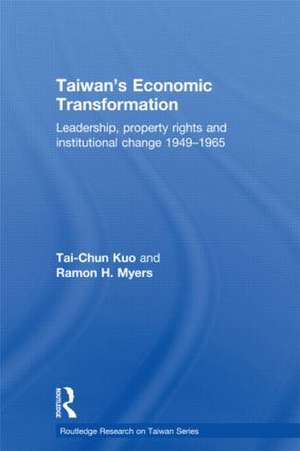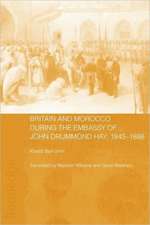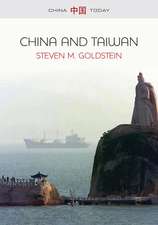Taiwan's Economic Transformation: Leadership, Property Rights and Institutional Change 1949-1965: Routledge Research on Taiwan Series
Autor Tai-Chun Kuo, Ramon H. Myersen Limba Engleză Paperback – 14 aug 2015
Using first-hand interview material with key government officials from the period, and analyses of hitherto unused Chinese-language archives including: the diaries of Chiang Kai-shek, Kuomintang party archives, and personal papers of Kuomintang leaders, as well as newspaper and journal articles published in Taiwan between 1949 and 1965, this book is both empirically rich, and gives the reader insights into Taiwan's developmental experience and the direction in which, under different circumstances, China's post-war expansion might have proceeded.
Taiwan's Economic Transition will be an invaluable resource for anyone interested in the economic and political history and development of Taiwan. More broadly it will also appeal to scholars and students of China's historical and contemporary development, Asian economics, and Asian studies.
| Toate formatele și edițiile | Preț | Express |
|---|---|---|
| Paperback (1) | 407.78 lei 6-8 săpt. | |
| Taylor & Francis – 14 aug 2015 | 407.78 lei 6-8 săpt. | |
| Hardback (1) | 1053.79 lei 6-8 săpt. | |
| Taylor & Francis – 8 iul 2011 | 1053.79 lei 6-8 săpt. |
Din seria Routledge Research on Taiwan Series
- 9%
 Preț: 934.96 lei
Preț: 934.96 lei - 24%
 Preț: 324.16 lei
Preț: 324.16 lei -
 Preț: 381.51 lei
Preț: 381.51 lei - 18%
 Preț: 999.19 lei
Preț: 999.19 lei -
 Preț: 398.60 lei
Preț: 398.60 lei -
 Preț: 350.68 lei
Preț: 350.68 lei -
 Preț: 449.41 lei
Preț: 449.41 lei -
 Preț: 482.74 lei
Preț: 482.74 lei - 18%
 Preț: 1006.92 lei
Preț: 1006.92 lei -
 Preț: 289.82 lei
Preț: 289.82 lei -
 Preț: 389.11 lei
Preț: 389.11 lei -
 Preț: 436.14 lei
Preț: 436.14 lei -
 Preț: 416.22 lei
Preț: 416.22 lei - 18%
 Preț: 1057.26 lei
Preț: 1057.26 lei - 13%
 Preț: 347.91 lei
Preț: 347.91 lei -
 Preț: 431.35 lei
Preț: 431.35 lei - 26%
 Preț: 765.26 lei
Preț: 765.26 lei -
 Preț: 412.37 lei
Preț: 412.37 lei - 31%
 Preț: 763.78 lei
Preț: 763.78 lei - 28%
 Preț: 821.14 lei
Preț: 821.14 lei -
 Preț: 416.22 lei
Preț: 416.22 lei -
 Preț: 408.54 lei
Preț: 408.54 lei - 18%
 Preț: 1109.18 lei
Preț: 1109.18 lei -
 Preț: 285.25 lei
Preț: 285.25 lei - 18%
 Preț: 1111.51 lei
Preț: 1111.51 lei - 19%
 Preț: 256.78 lei
Preț: 256.78 lei - 18%
 Preț: 1003.43 lei
Preț: 1003.43 lei - 28%
 Preț: 822.01 lei
Preț: 822.01 lei - 25%
 Preț: 769.10 lei
Preț: 769.10 lei - 18%
 Preț: 1061.93 lei
Preț: 1061.93 lei - 18%
 Preț: 1173.97 lei
Preț: 1173.97 lei -
 Preț: 410.66 lei
Preț: 410.66 lei - 18%
 Preț: 1064.01 lei
Preț: 1064.01 lei
Preț: 407.78 lei
Nou
Puncte Express: 612
Preț estimativ în valută:
78.03€ • 81.47$ • 64.43£
78.03€ • 81.47$ • 64.43£
Carte tipărită la comandă
Livrare economică 15-29 aprilie
Preluare comenzi: 021 569.72.76
Specificații
ISBN-13: 9781138858190
ISBN-10: 1138858196
Pagini: 176
Ilustrații: 6
Dimensiuni: 156 x 234 x 10 mm
Greutate: 0.25 kg
Ediția:1
Editura: Taylor & Francis
Colecția Routledge
Seria Routledge Research on Taiwan Series
Locul publicării:Oxford, United Kingdom
ISBN-10: 1138858196
Pagini: 176
Ilustrații: 6
Dimensiuni: 156 x 234 x 10 mm
Greutate: 0.25 kg
Ediția:1
Editura: Taylor & Francis
Colecția Routledge
Seria Routledge Research on Taiwan Series
Locul publicării:Oxford, United Kingdom
Public țintă
Postgraduate and UndergraduateCuprins
1. Posing the Problem 2. Taiwan’s Political Economy in Historical Perspective, 1683-1945 3. Taiwan’s Command Economy and the Tipping Point, 1945-1952 4. The First Debate, 1952-1954: Command Economy or Market Economy? 5. The Second Debate, 1954-1958: How to Restructure the Trade System? 6. The Third Debate, 1959 to 1960: Whether to Promote Foreign Investment? 7. Political Leadership, Institutional Change, and the Rise of a Modern Market Economy 8. Conclusion
Recenzii
"[T]his book gives the reader insights into Taiwan's developmental experience and the direction in which, under different circumstances, the Chinese post-war development of Taiwan might have proceeded. The work will be an invaluable resource for anyone interested in the economic and political history and development of Taiwan. More broadly, it will also appeal to scholars and students of China's historical and contemporary development, Asian economics, and Asian studies." - Cheng Linsun, Ph.D., University of Massachusetts-Dartmouth; Journal of International and Global Studies Vol. 3, No. 2 Spring 2012
'The chapters are particularly convincing in demonstrating the significance of technocratic elites to Taiwan’s shift to a market economy, and the volume overall would appeal to students and scholars of East Asian economic development.' - Fritz Gaenslen; JOURNAL OF CHINESE POLITICAL SCIENCE (2013)
'The chapters are particularly convincing in demonstrating the significance of technocratic elites to Taiwan’s shift to a market economy, and the volume overall would appeal to students and scholars of East Asian economic development.' - Fritz Gaenslen; JOURNAL OF CHINESE POLITICAL SCIENCE (2013)
Descriere
This book charts the period before Taiwan's post-war economic miracle took hold (1949-1965) and proffers that it was the Kuomintang Government's endorsement of property rights reform and institutional change that enabled Taiwan to transform from an impoverished command economy to a market-based economy, which in turn led to Taiwan becoming one of the fastest growing economies in the world.














